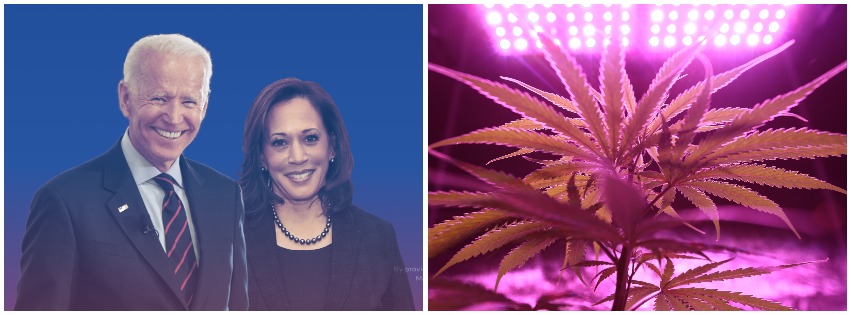What a Biden/Harris Ticket Means for Cannabis Industry Reform
N6A Cannabis Team Account Director Carrie Booze on the potential industry-wide boom from a Democratic presidential shakeup.
On August 11, Democratic presidential candidate Joe Biden announced Senator Kamala Harris as his pick for vice president, and the news was met with both enthusiasm and skepticism from cannabis advocates and entrepreneurs. Historically, the Democratic Party has shown more support for the federal legalization and decriminalization of cannabis than the GOP, yet Biden and Harris’s past sentiments on the issue have left some questions as to what stance they would take during their 2020 campaign and beyond.
Throughout his political career, Biden has upheld unwavering opposition to adult-use legalization. However, with Harris as his running mate, and with the cannabis industry’s undeniable ability to raise tax revenue — especially now during pandemic-induced state budget deficits — his views may be more malleable than once thought.

During a 2019 interview with radio show “The Breakfast Club,” Harris not only discussed her belief that cannabis should be legalized, but endorsed the need for continued research on the health benefits of the plant, its impact on the brain, and backed its medical efficacy. She also voiced her concern for the racial disparity in marijuana arrests and, to the surprise of many, admitted to having smoked cannabis once before. While an advocate today, Harris admittedly has not always had these views.
In 2010, Harris opposed Proposition 19 — also known as the Regulate, Control & Tax Cannabis Act — a ballot that would have legalized adult-use. Also, during her tenure as district attorney of San Francisco, she was renowned for cracking down on drugs and gangs, seeing more than 1,900 cannabis convictions come through her office.
It was during her second term as attorney general of California when Harris came out in support of the decriminalization of cannabis. In her remarks during the 2017 Center for American Progress Ideas Conference she said, “While I don’t believe in legalizing all drugs, as a career prosecutor I just don’t, we need to do the smart thing — the right thing — and finally decriminalize marijuana.”
Harris has since stuck with this narrative. In 2019, Harris went on to introduce a bill to federally deschedule and legalize marijuana.
Just last month, Harris cosponsored The Marijuana Opportunity, Reinvestment, and Expungement (MORE) Act, bipartisan legislation that removes marijuana from the Controlled Substances Act, thus decriminalizing the substance at the federal level and enabling states to set their own policies. It also calls for the allocation of federal funds for cannabis entrepreneurs of color and the expungement of marijuana possession charges from offenders’ records.
Biden still does not support federal legalization, but during their first joint interview with ABC News, the duo voiced their shared support for the decriminalization of the plant. Instead, Biden has vowed to change the way in which the country handles drug cases and opted for policies that promote rehabilitation over incarceration.
The case for legalization is strong, especially in a post-pandemic atmosphere when the country will need to rebuild the economy. For instance, The California Department of Tax and Fee Administration reported that cannabis tax revenues in the second quarter of 2020 soared 32.6 percent from 2019, to another record of $208.4 million, and this does not include revenues collected by cities and counties. Over the first two quarters combined, cannabis tax revenues, at $414 million, were up 44 percent from the same period in 2019 and by 150 percent from the same period in 2018.
In addition to tax revenue, employment rates and real estate values also increase with the approval of medical and adult-use marijuana. Between cultivation and manufacturing facilities, dispensaries, and countless ancillary businesses that support cannabis, the industry has reportedly created more than 211,000 full-time employment positions in the United States. Cannabis has the ability to help revive the country that, as of July 2020, had an unemployment rate of 10.2 percent.
With a mere three months until Election Day, we will likely see the subject of drug reform be touched on in future debates between the two parties. While the impact of a White House takeover by the Democratic candidates is still undetermined, we can expect much more conversation surrounding marijuana reform than seen over the past four years.
Since his election as commander in chief, President Trump has threatened to ignore Congress’s protection laws for marijuana in each state and, more recently, his administration has proposed removing medical marijuana protections in the 2021 fiscal budget. During the 2020 Republican National Convention, multiple speakers expressed critical views about the cannabis industry and expressed their disdain for dispensaries being deemed “essential businesses” amid the pandemic. Otherwise, the Trump administration has done little to push the industry forward and instead have agreed to leave it up to the states.
Currently, seven states are posed to have legalization initiatives on their November ballots. Arizona, Montana, New Jersey, and South Dakota have ballot measures for adult-use, and Idaho, Mississippi, Nebraska, and South Dakota ballot measures would allow for a medical cannabis program. For the foreseeable future, we will continue on this path of slow, fragmented adoption.
No matter the outcome of the election, brands will need to secure a strong presence with a public relations preparation, especially considering how the cannabis industry seems much brighter under a Biden/Harris ticket. At the very least, it will revitalize the conversation surrounding cannabis decriminalization and full legalization, and bring the issue back up to federal consideration.

